|
|
|
Sort Order |
|
|
|
Items / Page
|
|
|
|
|
|
|
| Srl | Item |
| 1 |
ID:
109218


|
|
|
|
|
| Publication |
2011.
|
| Summary/Abstract |
In order to solve North Korea's nuclear problem holistically, a new comprehensive approach is needed. This approach should comprise a method of redirecting the North's nuclear workers to other civilian occupations for irreversible dismantling of its nuclear weapons program and supplying the North with nuclear energy without proliferation risk, which will help to eradicate the necessity and false excuses of its indigenous nuclear development program. This paper reviews some previous proposals of the multilateral approach to the nuclear fuel cycle, since 2003, and proposes a comprehensive multilateral approach to solve North Korea's nuclear problem.
|
|
|
|
|
|
|
|
|
|
|
|
|
|
|
|
| 2 |
ID:
109215
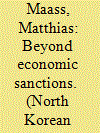

|
|
|
|
|
| Publication |
2011.
|
| Summary/Abstract |
In 2010, Taiwan's president, Ma Ying-jeou, explained the rationale for his country signing a major economic cooperation treaty with mainland China with the following statement: "We can handle diplomatic isolation, but economic isolation is fatal." This essay will make the argument that in the case of North Korea, the opposite is true: Economic isolation appears fairly manageable for Pyongyang, but diplomatic sanctions may in fact enhance a broad coercive strategy significantly.
This argument will be framed within the broader claim that in particular in the case of North Korea, sanctions have been conceptualized too narrowly-they have been viewed as economic coercion only. Instead, the argument is made that sanctioning states should consider the entire spectrum allowed under Chapter VII, Article 41 of the UN Charter.
The discussion in this article will be limited to the case of North Korea for reasons of space and the urgent need to address the deteriorating security situation on the Korean Peninsula, given the country's rise to quasi-nuclear power status. In light of this development, the sanctions regime currently in place needs to be reevaluated. A reorientation towards diplomatic sanctions will allow for a broader coercive strategy that is mindful of nuclear deterrence but goes beyond economic sanctions, which have not been successful in restricting Pyongyang's military-strategic objectives.
|
|
|
|
|
|
|
|
|
|
|
|
|
|
|
|
| 3 |
ID:
109224


|
|
|
|
|
| Publication |
2011.
|
| Summary/Abstract |
This chapter (Chapter 7 in The Survival of North Korea) provides a brief survey of China-North Korea relations, assesses China's objectives and actions, and raises policy issues for the United States. It finds that while Beijing maintains its military alliance and continues its substantial trade and economic assistance to Pyongyang, in recent years many Chinese and North Korean interests and goals have grown increasingly incompatible. In China, more and more officials and scholars appear to regard North Korea as more of a burden than a benefit. However, Beijing's shared interest with Pyongyang in preserving North Korean stability generally has trumped these other considerations.
|
|
|
|
|
|
|
|
|
|
|
|
|
|
|
|
| 4 |
ID:
109209
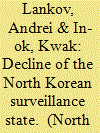

|
|
|
|
|
| Publication |
2011.
|
| Summary/Abstract |
One of the peculiarities of the North Korean system is the cohesive nature of state surveillance. This surveillance operates through two major channels: at his/her job a North Korean is controlled by the "organization," and in his/her place of residence surveillance is done by the "people's group." This article, based on the refugees' testimony and available publications, traces the origin and the types of surveillance used by the "people's groups." Nonpolitical activities of the "people's groups" are discussed as well. Finally, the article traces how the "people's groups" have changed in the last two decades as state control began to disintegrate.
|
|
|
|
|
|
|
|
|
|
|
|
|
|
|
|
| 5 |
ID:
109216


|
|
|
|
|
| Publication |
2011.
|
| Summary/Abstract |
Contrary to the traditional thinking in political liberalism that intertwined economic interests would prevent conflict, South Korea's unilateral engagement policy with North Korea has failed to ease military confrontation, as North Korean boats have continued to cross the Northern Limit Line (NLL). In the economic crisis of the 1990s, North Korea was largely dependent on the fishery industry in order to earn foreign currency. North Korea's outdated fishing boats could not travel beyond its inland sea, but were pressured to fulfill their quota of marine product catches. As a consequence, North Korea's outdated fishing boats were likely to cross the NLL in the hope of exploiting neighboring waters near the NLL. This paper demonstrates that North Korea's NLL violations rise and fall based not on South Korea's engagement or containment policy toward North Korea, but rather on North Korea's need to catch more marine products. The views expressed here are the opinions of the authors and as such do not represent the official position of the South Korean government.
|
|
|
|
|
|
|
|
|
|
|
|
|
|
|
|
| 6 |
ID:
109223
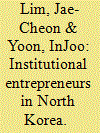

|
|
|
|
|
| Publication |
2011.
|
| Summary/Abstract |
This paper analyzes North Korea's private business entities that are considered to be "shadowy" for three reasons: First, shadowy private enterprises (SPEs) are "not officially recognized" as legitimate corporate entities by the government. Second, they are "not permitted to be registered" in the official enterprise list. Third, because of these two reasons, they are "ostensibly unidentified" under the country's socialist economy. The paper classifies SPEs into two categories: SPEs that are officially state-owned enterprises (SOEs) but are private in nature (financed and managed by private individuals) and those emerging in newly created economic areas. As institutional entrepreneurs, SPEs represent the interests of various market forces, leverage resources to develop market institutions, and contribute to the transformation of economic institutions. This article was funded by Korea University.
|
|
|
|
|
|
|
|
|
|
|
|
|
|
|
|
| 7 |
ID:
109213
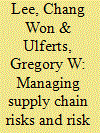

|
|
|
|
|
| Publication |
2011.
|
| Summary/Abstract |
Effective risk management in the supply chain of a company is a core business competency. In this case study, a major company in the Kaesong Industrial Complex in North Korea is used to evaluate strategic planning in supply chain risk management. In this company, four supply chain risks (financial, operational, human resources, and information) are identified and prioritized in terms of four strategies (cost, quality, delivery, and flexibility) using the analytic hierarchy process. The results are analyzed to provide supply chain risk mitigation strategies and their implications for the company. This study reinforces the importance of strategic planning for supply chain risk management in providing competitive advantage and future survival.
|
|
|
|
|
|
|
|
|
|
|
|
|
|
|
|
| 8 |
ID:
109211
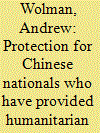

|
|
|
|
|
| Publication |
2011.
|
| Summary/Abstract |
For many years, Chinese nationals threatened with torture or persecution for their role in helping North Korean escapees had little success gaining protection from removal in U.S. courts. In 2009 and 2010, however, some courts bucked this trend, showing a greater acceptance of both the dangers faced by Chinese nationals suspected of assisting North Koreans, and the political nature of their actions. However, inconsistency remains on the fundamental question of whether Chinese authorities have engaged in the persecution of individuals who have assisted North Koreans, or whether they instead have legitimately prosecuted them pursuant to Chinese law.
|
|
|
|
|
|
|
|
|
|
|
|
|
|
|
|
| 9 |
ID:
109221


|
|
|
|
|
| Publication |
2011.
|
| Summary/Abstract |
The Obama administration has been pursuing a policy of "strategic patience" on North Korea, essentially a dual-track policy that keeps engagement open for its good behavior while seeking to impose sanctions for its bad behavior. The strategic patience policy is a clear break with the former Bush administration's robust engagement policy in that it first and foremost demands North Korea's change in behavior before any serious talks or negotiation. But a series of North Korea's provocations since the Obama administration took office in 2009 questioned the validity and effectiveness of the strategic patience policy. It has failed to contain North Korea's increasing nuclear arsenal. In particular, North Korea's intentional disclosure of its uranium enriched program (UEP) and the nation's unusual emphasis on the fallacy of Libya's nuclear abandonment on the heels of the Western allies' recent attack deals a devastating blow to the sustainability of the two-year-old policy, serving as a telling reminder that North Korea has no intention of giving up its nuclear program. This article examines the balance sheet of the strategic patience policy and seeks to present a feasible and realistic solution.
|
|
|
|
|
|
|
|
|
|
|
|
|
|
|
|
|
|
|
|
|